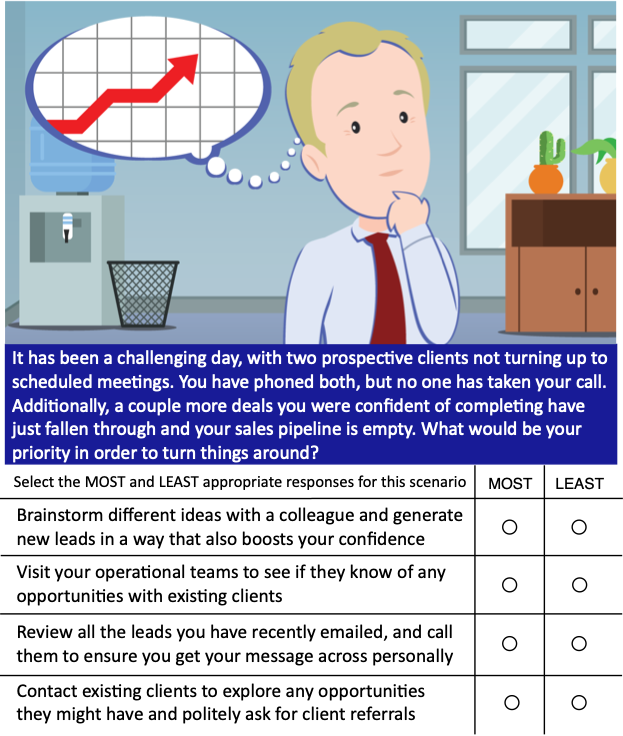Sales SJT
Call or email to discuss our tests or to book a demonstration of our platform +44 (0)7872 019525 or support@viewpoint-psychology.com
What do Situational Judgement Tests assess?
A Situational Judgement Test or SJT is a type of psychometric test that presents candidates with real-life work situations and then asks them to decide on the best response to that situation. The Sales SJT is a situational judgement test that is specifically geared towards situations that someone in the early stages of their career may encounter across different industries.
Typical roles that would use our Sales SJT are:
1. Sales Executives
2. Customer Service
3. Business Development
Overview of the Sales SJT
Our Sales SJT presents candidates with 12 distinct situations that many sales managers and executives might find familiar across a variety of organisations. For each situation, 4 possible responses are given, each presenting a feasible response someone in a role may take. Candidates are asked to review these responses and select 1 response they consider to be ‘ most appropriate’ and another they think would be the ‘least appropriate’. As with all our SJTs, the Sales SJT is untimed but typically takes 10 minutes to complete.
Our Sales SJT measures 3 competencies / behaviours:
1. Purposeful Collaboration: Building and maintaining key relationships.
2. Business Understanding: Understanding and establishing the market and different company requirements, including own company.
3. Driving Peak Performance: Driving sales growth in a systematic, sustainable and scalable manner.
Example Sales SJT Question

Sales SJT - Sample Reports
On completion of the Sales SJT, you can download 2 reports as standard:
1. Recruitment Report, where the content is designed for an organisation and supports a recruitment decision. This report provides tests scores, behavioural interpretation and interview questions.
2. Candidate Report, where the content is designed for a candidate(s) and provides feedback on the test performance. This report provides behavioural interpretation and suggests development goals for improving their competencies.
Free Tests!
Take a free test. On completion you will be able to download a detailed report based on your results. We will not ask you for any personal information to be able to view your report.
Take a free Critical Reasoning Test
How to do well in your Sales SJT
To do well in a Sales SJT, it is good to implement the following tips…
1. Identify Customer Needs and Preferences: In sales, understanding the specific needs, preferences, and motivations of customers is crucial. For SJT scenarios, choose responses that show your ability to quickly assess customer requirements and suggest products or solutions that align with their interests. Demonstrating a personalized approach in addressing their concerns or queries can be key.
2. Effective Communication and Persuasion Skills: A sales role often requires persuasive communication skills to convince potential customers of the value of your products or services. In the SJT, look for options that display your capability to communicate benefits effectively, handle objections gracefully, and persuade customers without being pushy or aggressive.
3. Adherence to Ethical Sales Practices: Upholding integrity and ethical standards in sales is paramount. When faced with SJT scenarios, opt for responses that demonstrate your commitment to honest and ethical selling practices. This includes being truthful about product capabilities, respecting customer decisions, and avoiding misleading information.
